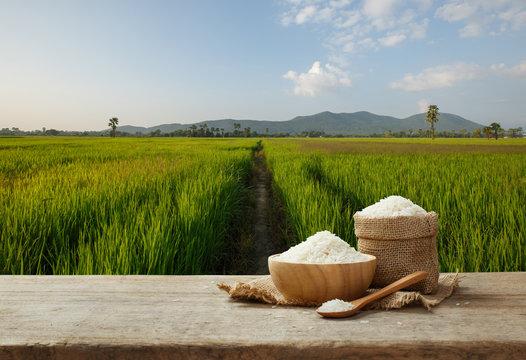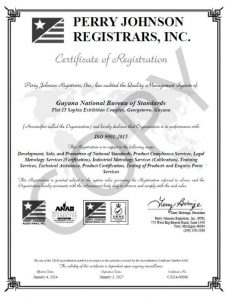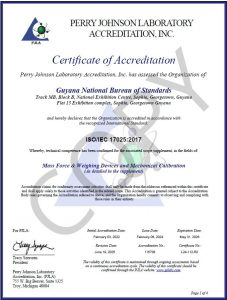The harvesting of the second rice crop for 2021 is about to commence in the various rice-growing regions of Guyana, and while farmers are aiming to maximize profits from their yields, millers are aiming to buy and stockpile paddy at reasonable prices. To ensure that both farmers and millers receive the best deals, there must be accuracy and transparency in all transactions.
Transparency between farmers and millers is primarily critical in testing for the moisture content of paddy, determination of dockage and the determination of weights supplied. These aspects, individually and collectively, affect the actual price a miller pays to a farmer.
As the organisation legally responsible for measurements in Guyana by virtue of the 1981 Weights and Measures Act, the Guyana National Bureau of Standards (GNBS) works to ensure farmers and millers benefit from a reliable measurement system in the industry. The Bureau also has a number of standards to streamline the production processes and ensure quality rice is produced for local consumption and export.
Prior to the rice crop (harvesting), the Bureau verifies measuring devices used throughout the industry including weighbridge scales, platform scales, hopper scales and smaller laboratory scales. So far, in anticipation of the second crop at the beginning of September, verification of these weighing and measuring devices is on schedule. Inspectors of the GNBS have been using the test truck and large capacity masses to conduct the verification of weighbridge (truck) scales at rice mills in Regions 2, 3 4, 5 and 6. Other smaller devices also are being verified during visits to these mills.
Meanwhile, millers have been submitting their moisture meters used to determine the moisture content of paddy to the GNBS Main Office and its branch offices in Regions 2 and 6. Earlier this year, the Bureau commenced the verification of the commercial types of moisture meters instead of those domestic types used in the industry over the years. The commercial types of moisture meters are more applicable to production seen across the industry. Commercial moisture meters include Steinlite NTEP Moisture Tester SL95, Dickey-john Commercial NTEP Grain Tester GAC2500UGMA and the Perten AM 5200 Moisture Meter.
Apart from ensuring reliable measurements, the implementation and use of standards are very important and can be considered essential for addressing quality issues in the rice industry.
The CARICOM Standard –Specification for Rice” (GCP 10:2003) which is also a National standard prescribes hygienic and safety practices for the processing, packaging, storage, and transport of rice for human consumption.
By implementing this standard, producers within the industry can meet production and harvesting requirements, hygienic processing requirements, design and facilities requirements and other hygienic requirements. Conforming to the requirements of this and other related standards could help to improve quality, increase production efficiency, and protect consumers’ health and safety.
As preparations are made to commence second crop 2021, it is important to remind farmers to be present at mills to oversee the measuring of paddy sold to millers, and to ensure that scales and moisture meters are verified. Scales must indicate zero before weighing commences.
For millers, it is important that they allow farmers to witness the weighing of paddy and the processes of determining moisture and dockage content. Additionally, millers should promptly address queries raised by farmers to ensure transparency, and ensure all transactions are conducted in the SI (Metric) units of measurement.
For further information, call the GNBS on telephone numbers: 219-0065 or visit the GNBS website: www.gnbsgy.org or facebook.com/gnbsgy






